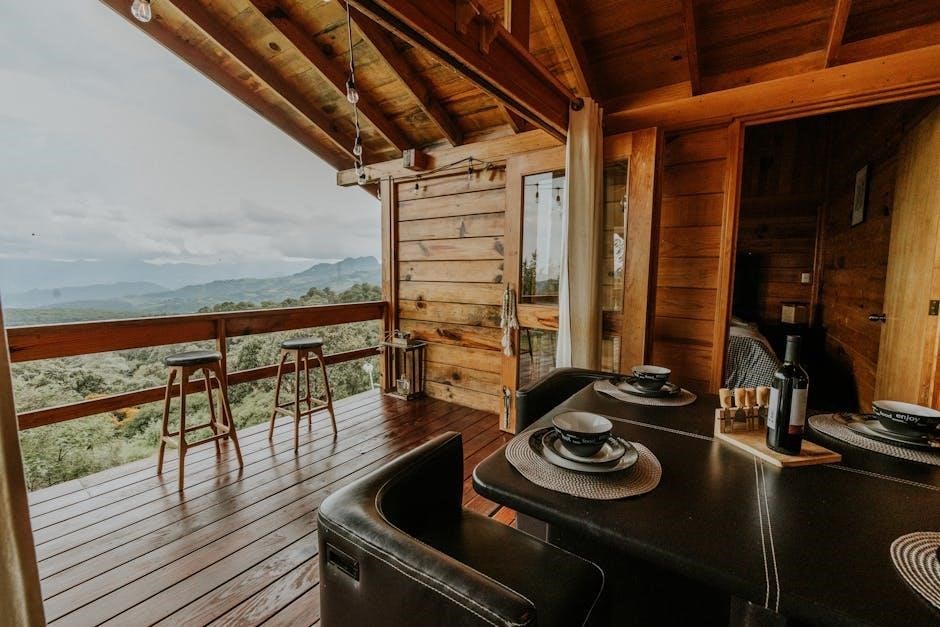Airbnb’s 2009 pitch deck is a legendary blueprint for startups, showcasing simplicity and clarity. It raised $600K, fueling Airbnb’s rise to a $20B valuation. Available as a PDF, it offers insights into effective storytelling and persuasion, making it a must-study for entrepreneurs aiming to craft compelling pitches.
Overview of Airbnb’s 2009 Pitch Deck
Airbnb’s 2009 pitch deck, now widely studied, is a masterclass in simplicity and effectiveness. Comprising just 10 slides, it succinctly conveyed the startup’s vision, market opportunity, and unique value proposition. The deck’s clarity and focus were instrumental in securing $600K in funding from Sequoia Capital and Y Ventures, setting the stage for Airbnb’s meteoric rise. Its success lies in its ability to distill complex ideas into digestible, visually appealing content, avoiding unnecessary jargon and excess data. This approach not only resonated with investors but also established a benchmark for startup pitches, emphasizing storytelling, concise financials, and a clear path to growth.
Importance of the Pitch Deck in Startup Success
A pitch deck is a cornerstone for startups, serving as a bridge between ideas and execution. Airbnb’s 2009 pitch deck exemplifies this, demonstrating how a well-crafted presentation can transform a concept into a funded reality. It effectively communicated the company’s vision, market potential, and unique value proposition, securing $600K in early funding. The deck’s simplicity and clarity highlighted the founders’ understanding of their market and audience, establishing credibility and trust with investors. By distilling complex ideas into concise, visually appealing slides, Airbnb set a benchmark for startups to articulate their stories persuasively. This approach not only secured funding but also laid the groundwork for Airbnb’s rapid growth and global impact.

Slide-by-Slide Breakdown of Airbnb’s Pitch Deck
Airbnb’s 2009 pitch deck is a masterclass in simplicity and effectiveness. Its 10 slides systematically cover problem, solution, market validation, product, and financials, guiding investors through the vision seamlessly.
Cover Slide: First Impressions and Branding
Airbnb’s cover slide is a masterclass in simplicity and branding. It features the company name, logo, and a concise tagline: “Book rooms with locals, rather than hotels.” This approach immediately communicates Airbnb’s unique value proposition, setting the tone for the rest of the pitch deck. The slide’s clean design and focused messaging ensure a strong first impression, essential for capturing investors’ attention. By keeping it straightforward, Airbnb effectively introduces its brand and mission, laying the groundwork for the detailed slides that follow. This slide exemplifies how less can be more in pitch deck design.
Problem Slide: Identifying Key Issues in the Travel Industry
Airbnb’s problem slide effectively outlines three key challenges in the travel industry: expensive hotels, lack of local insights, and limited social interaction. These issues are presented clearly and concisely, ensuring investors immediately understand the need for a new approach. By highlighting these pain points, Airbnb establishes a strong foundation for its solution. The slide avoids industry jargon, making it accessible to all audiences. This straightforward approach ensures the problems resonate universally, setting the stage for Airbnb’s innovative solution. The clarity and simplicity of this slide are integral to the pitch deck’s success, demonstrating the company’s deep understanding of traveler needs.

Solution Slide: Introducing Airbnb’s Innovative Approach
Airbnb’s solution slide presents a clear and concise answer to the travel industry’s challenges. It introduces a web platform where users can rent spaces from locals, offering affordability, unique experiences, and authentic interactions. By focusing on simplicity, Airbnb’s solution directly addresses the problems highlighted earlier. The platform’s innovative approach emphasizes community-driven travel, allowing hosts to monetize unused spaces while providing travelers with cost-effective alternatives to traditional hotels. This slide effectively communicates Airbnb’s value proposition, showcasing how its solution disrupts the status quo and meets the growing demand for personalized travel experiences. The clarity and brevity of this slide make it highly persuasive, aligning perfectly with the problems outlined previously.

Market Validation and Opportunity
Airbnb’s pitch deck highlights market validation through growing demand on platforms like Craigslist and Couchsurfing, showcasing over 500,000 users seeking affordable, community-driven accommodations, validating its innovative solution.
Market Validation: Demonstrating Demand for Airbnb
Airbnb’s pitch deck effectively demonstrated market demand by highlighting existing user behavior on platforms like Craigslist and Couchsurfing. With over 500,000 Couchsurfers seeking free stays and Craigslist users renting spaces, Airbnb validated the desire for affordable, community-driven accommodations. This slide showcased how people were already embracing alternative travel options, proving the concept’s viability. By leveraging these trends, Airbnb convinced investors that its platform could tap into a growing market. The inclusion of real user testimonials further strengthened credibility, illustrating that travelers were eager for authentic, cost-effective experiences. This strategic validation laid the groundwork for Airbnb’s disruptive entry into the travel industry, aligning with investor interests in scalable, high-demand solutions.
Market Size: Estimating the Potential of the Sharing Economy
Airbnb’s pitch deck highlighted the vast potential of the sharing economy by estimating the total addressable market for budget and online travel at $107 billion in 2008. The company aimed to capture 20% of this market, projecting $21.4 billion in potential revenue. This ambitious target underscored Airbnb’s disruptive potential in the travel industry. By 2019, Airbnb’s revenue reached $4.8 billion, surpassing initial projections and validating the market’s immense growth. The slide effectively communicated the sharing economy’s scalability, positioning Airbnb as a leader in a rapidly expanding sector. This clear vision of market potential was instrumental in securing investor confidence and funding.
Product and Business Model
Airbnb’s pitch deck showcased a web platform connecting travelers with local hosts, offering unique stays. The business model featured a 10% commission on bookings, simplifying the value proposition and clearly outlining revenue generation.
Product Showcase: Simplifying the Value Proposition
Airbnb’s product showcase slide succinctly highlighted its platform as a web-based marketplace connecting travelers with local hosts. By focusing on simplicity, the slide effectively communicated the core value proposition: unique, affordable stays. Screenshots and bold headlines emphasized ease of use, while a clear commission structure—10% per transaction—provided transparency. This straightforward approach allowed investors to quickly grasp the product’s potential without overwhelming details, ensuring the pitch remained focused and impactful. The slide’s clarity aligned with Airbnb’s broader mission to disrupt traditional hospitality by offering authentic experiences at scale. This simplicity became a hallmark of Airbnb’s success story.
Business Model: Clarity in Revenue Generation
Airbnb’s business model slide emphasized simplicity and transparency, revealing a commission-based revenue stream of 10% per transaction. This straightforward approach made it easy for investors to understand the financial mechanics. The slide avoided complexity, focusing solely on the core revenue driver, while also highlighting the average booking price and potential market size. By clearly articulating how the platform generated income, Airbnb demonstrated scalability and alignment with its mission to offer unique, affordable stays. This clarity in revenue generation was pivotal in building investor confidence and showcasing the company’s potential for sustained growth in the sharing economy. The model’s simplicity remains a key factor in Airbnb’s enduring success.

Competitive Advantages and Team
Airbnb’s competitive advantages and team slide highlighted its unique value proposition, strong founder vision, and early-market dominance, positioning it as a leader in the sharing economy.
Competitive Advantages: What Sets Airbnb Apart
Airbnb’s competitive advantages were highlighted in its pitch deck, showcasing its unique value proposition. The platform offered affordability, authenticity, and accessibility, disrupting traditional hospitality. By leveraging existing spaces and personal connections, Airbnb created a community-driven experience. Its dual revenue streams from hosts and guests ensured scalability. The deck emphasized first-mover advantage, simplicity, and ease of use, distinguishing it from hotels and classifieds. Host incentives and verified profiles built trust, while its go-to-market strategy targeted niche markets effectively. These factors positioned Airbnb as a pioneer in the sharing economy, capitalizing on unmet demand for personalized travel experiences.
Team Slide: Highlighting Founders’ Vision and Expertise
The team slide in Airbnb’s pitch deck underscored the founders’ vision and expertise. Brian Chesky, Joe Gebbia, and Nathan Blecharczyk were portrayed as a dynamic trio with complementary skills. Their backgrounds in design, engineering, and entrepreneurship highlighted their ability to execute. The slide emphasized their passion for solving real-world problems and creating a community-driven platform. By focusing on core team members, Airbnb demonstrated a clear path to growth. This slide reassured investors that the leadership was capable of scaling the business, making it a pivotal part of the pitch. Their dedication and unique blend of skills set the foundation for Airbnb’s success.

Financial Projections and User Testimonials
Airbnb’s pitch deck combined ambitious financial goals with real user stories, showcasing both viability and customer satisfaction. This blend of data and authenticity strengthened investor confidence in the business model;

Financial Projections: Clear and Ambitious Goals
Airbnb’s 2009 pitch deck included concise financial projections, aiming for 80,000 transactions. This ambitious yet straightforward goal demonstrated scalability and potential, appealing to investors like Sequoia Capital. The simplicity of the financial slide, focusing on key metrics, made it easy to understand and align with the company’s early growth strategy. While the deck lacked details on fund usage, the clarity of the projections highlighted Airbnb’s confidence in its business model. This approach effectively balanced simplicity with ambition, showcasing a clear path to success and helping secure critical early funding.
User Testimonials: Building Credibility with Real Stories
Airbnb’s pitch deck features a slide dedicated to user testimonials, showcasing real stories from hosts and travelers. These testimonials are crucial for building credibility, as they highlight positive experiences and demonstrate the platform’s value. By sharing quotes from satisfied users, Airbnb proves its concept works in the real world. This slide bridges the gap between idea and execution, offering social proof that resonates with investors. The testimonials emphasize unique experiences, such as staying with locals, which differentiate Airbnb from traditional hotels. This approach not only builds trust but also underscores the platform’s potential to disrupt the travel industry, making it a compelling narrative for investors.
